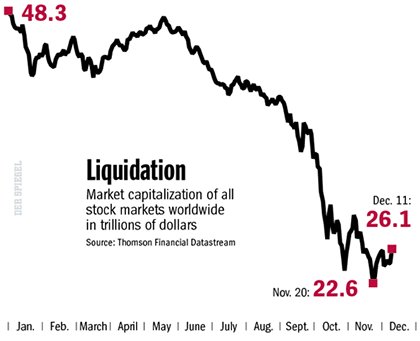|
"In 2007, LEAP/E2020 announced that US banks and consumers were both insolvent.
More than a year ago, our team estimated that USD 10,000-billion worth in «
ghost-assets » would vanish in the crisis. Both announcements came in complete
opposition with the common opinion of that time; however they proved perfectly
justified in the months after. In the same line, LEAP/E2020 today estimates that
a new sequence of the fourth phase (so-called « decanting phase ») of the
unfolding global systemic crisis has began: the sequence of global insolvency.

A simple example can help to understand what is at stake.
If you meet a
temporary problem of cash, and if your bank or your family agrees to lend you
the money you need to cross over that difficult path, their effort is mutually
beneficial. Indeed, you can resume your activity, you can pay your employees and
yourself, your bank or your family get their money back (with an interest in the
case of the bank), and the economy in general benefited from a positive
contribution.
But if your problem is not due to a question of cash-flow, but to
the fact that your activity has ceased to be profitable and will never be again
because of new economic conditions, then the effort made by your bank or family
becomes all the more dangerous that it was substantial. Indeed, in all
likelihood, your first call for funds will soon be followed by more calls,
always matched with promises (honest ones we suppose) that difficult times are
about to be over.
The more your bank or your family has lent you (and therefore
the more it would lose if your activity is stopped) the more willing they will
be to continue helping you. However if the situation worsens, and it will if it
comes from a problem of profitability, there is a moment when the limits are
reached: on the one hand, your bank will decide that there is more to lose in
keeping supporting you than in letting you down; on the other hand, your family
ends up with no money left because you have siphoned its entire savings. Then it
appears clearly to everyone not only that you are insolvent or bankrupt, but
that you dragged down with you your family or your bank (4). You have thus dealt
a severe blow on the economy around you, including on your close relatives (5).
It is important to highlight the fact that all this could take place in all
sincerity because you were not aware of the impact on your activity of a sudden
change in the economic context disrupting the conditions of your profitability....."
citeste tot articolul...
|

